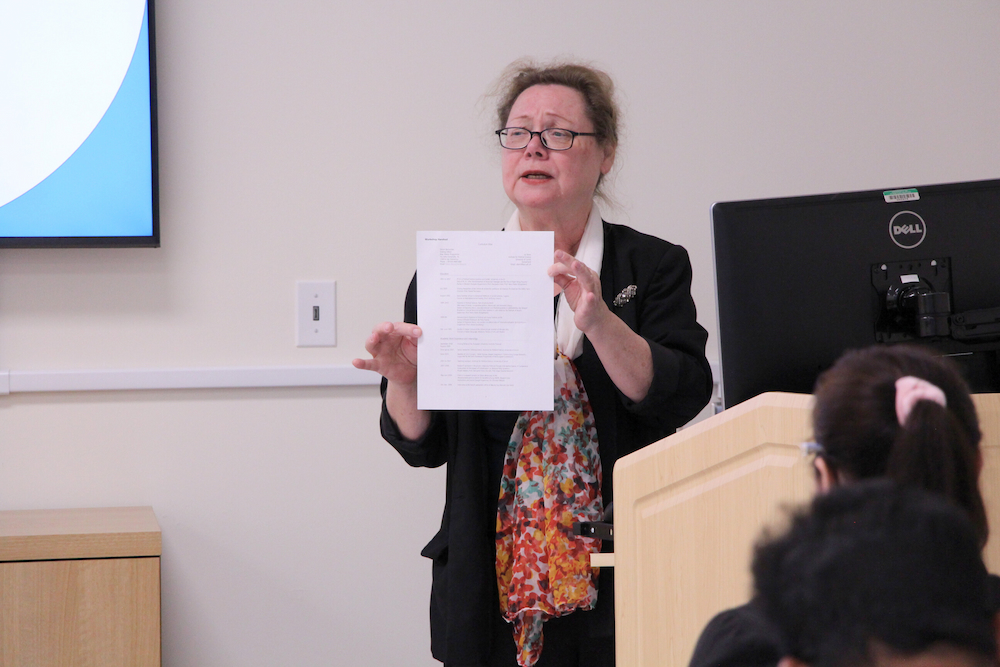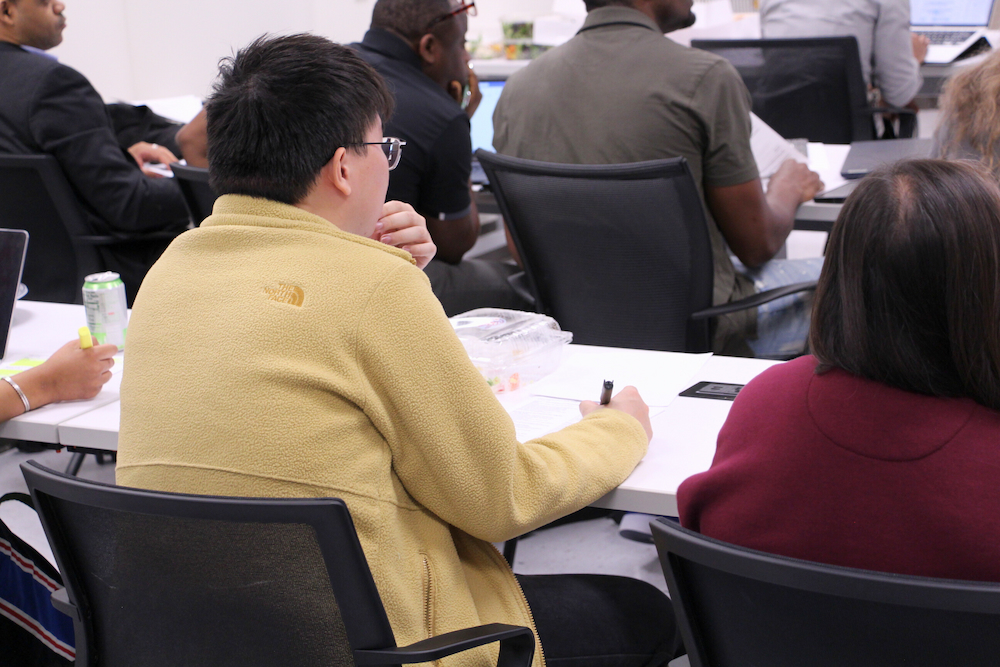The classroom was filled to capacity as the School of Public and Population Health (SPPH) hosted "Public Health Pro Files: Resume & CV Mastery" as part of National Public Health Week. Featuring research communications expert Sarah Toombs Smith, PhD, ELS, the well-attended workshop provided students with practical guidance on crafting effective CVs, resumes, and cover letters for both academic and non-academic careers.
Expert Guidance from a Seasoned Professional

With over 30 years of experience as a board-certified Editor in the Life Sciences, Dr. Toombs Smith shared her expertise with SPPH students preparing to enter the job market. Currently serving as Research Communications Manager in UTMB's Department of Biostatistics & Data Management, she has edited countless grants, research articles, and professional documents throughout her career.
"I like to think of myself as a translator: I translate what people write into what they meant to write," Toombs Smith explained, highlighting her approach to helping professionals communicate effectively.
The Curriculum Vitae: Your Professional Database
Toombs Smith began by explaining the purpose and structure of an academic CV, emphasizing its function as a comprehensive record of professional accomplishments.
"Your CV serves as a kind of database for the information you're going to want to use later on," she advised, stressing the importance of maintaining this document throughout one's career.
Key CV recommendations included:
- Present information in reverse chronological order for easy access
- Include complete information for each entry (titles, dates, collaborators)
- Maintain error-free content with regular updates
- Create user-friendly formatting with adequate white space and clear section markers
- Establish a routine for regular updates to prevent forgetting accomplishments
"You forget stuff," Toombs Smith cautioned. "Figure out some kind of way to track your activities and record them in a timely fashion—once a month, once a quarter, something like that."
Resumes: Targeted Marketing for Non-Academic Positions
The workshop then shifted to resume development, highlighting the critical differences between academic CVs and job-focused resumes.
"Resumes are used for non-academic jobs, and they're different because what they're used for is different," Toombs Smith explained. "A resume provides the highlights, not everything like a CV."
While covering resume basics, she emphasized several essential strategies:
- Keep resume length to 1-2 pages, focusing on relevant highlights
- Quantify accomplishments and competencies wherever possible
- Incorporate keywords from job descriptions to overcome automated screening systems
- Provide a summary of competencies and accomplishments targeted to specific positions
- Maintain reverse chronological order, complete information, and user-friendly formatting
Core Public Health Competencies: Your Professional Framework
Toombs Smith introduced students to the Core Competencies for Public Health Professionals developed by the Council on Linkages Between Academia and Public Health Practice, encouraging them to identify their strengths across eight key domains:
- Analytical/Assessment Skills
- Policy Development/Program Planning Skills
- Communication Skills
- Cultural Competency Skills
- Community Dimensions of Practice Skills
- Public Health Sciences Skills
- Financial Planning and Management Skills
- Leadership and Systems Thinking Skills
Participants were encouraged to think broadly about their experiences, recognizing that skills developed through coursework, class projects, and various activities all contribute to their professional competency profile.
Cover Letters: The Decorations on the Cake
"The cover letter is like the decorations on the cake," Toombs Smith explained. "The cake might be great, but what makes you want to buy it—what makes you want to bite it—is the decoration."
She emphasized that hiring managers value cover letters because they demonstrate a candidate has thoroughly considered the position and can articulate why they're a good fit.
Her recommendations for effective cover letters included:
- Limit length to one page, focusing on specific skills and competencies
- Avoid generic statements and overuse of adjectives and adverbs
- Concentrate on concrete examples that demonstrate qualifications
- Align content with the specific needs listed in job descriptions
- End by "talking past the sale" with forward-looking language
"Get specific," she advised. "Put away all your adjectives and adverbs. They don't really do anything at all. Just give me specifics."
Real-World Application
The session concluded with an interactive analysis of actual job listings. Participants examined positions requiring public health backgrounds, identifying key skills, requirements, and terminology they should highlight in their application materials.
Toombs Smith encouraged students to look beyond the specific qualifications listed in job descriptions. "Most companies, when they write a job description, put everything in there that they think they could possibly use for this person," she noted, advising students not to be discouraged if they don't meet every requirement.
"You shouldn't be afraid if you think it might be a good fit," she concluded. "You should go ahead and give it a try."
The workshop provided SPPH students with practical tools and strategies to effectively market themselves in both academic and non-academic settings—valuable guidance as they prepare to advance their careers in public health.
Need help updating your CV or resume?
SPPH career advisors are available for one-on-one appointments to provide personalized guidance throughout the job search process.
